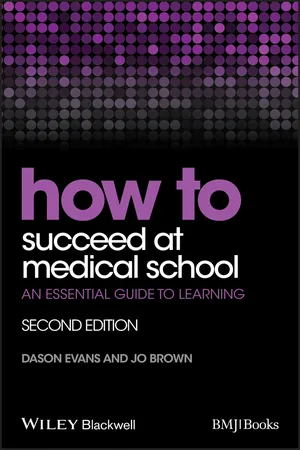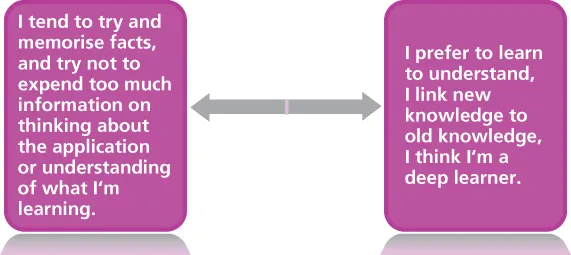
- English
- ePUB (mobile friendly)
- Available on iOS & Android
About This Book
Can you adapt to the wide variety of learning environments in medicine?
Can you show your best abilities in the exams at the same time as learning to be a doctor?
Can you balance your studies with an enjoyable social life?
Can you develop your professionalism and manage your 'digital footprint'? How to Succeed at Medical School will help you learn these vital skills, and much more. Written by experienced medical school teachers and packed full of case studies, illustrations, quotes from other students, tip boxes, exercises, portfolios and learning techniques to help you communicate, study and revise- it's an essential resource to help you thrive at medical school. This thoroughly updated second edition includes new chapters on Professionalism and Teaching, and provides invaluable insight into what to expect from the start of medical school right through to the start of your medical career.
Frequently asked questions
Information
Chapter 1
What kind of learner are you?
Overview
Introduction
- cognitive aspects (how deep is your learning?)
- motivation (what drives you to learn?)
- self-regulation of study skills (are you aware of how you learn?)
- how do you know when you know enough?
- conception of learning (what you think learning is for?)
- learning in groups (love it or hate it)
- mood and learning (a help or a hindrance)
- VARK (your preferences in using your senses in learning).
Aspects of learning
Filling in a learning style questionnaire was fantastic, it helped me realise the kind of learner I am and build on my natural style.Jo, first-year graduate entry student.
Cognitive aspects
EXERCISE

Motivation
EXERCISE
- If you find the science fascinating, spend a couple of hours each week in the library looking at the journals—Nature, The Lancet. When learning about diabetes, you will want to read about insulin receptors, about the pathology, about the underlying mechanisms by which diabetes causes increased cardiovascular risk, in addition to the core areas that you need to learn. The commonest pitfall if you are this kind of learner is that you might have some trouble with knowing when to stop reading and when enough is enough—you cannot have a PhD level of knowledge on everything in medicine; we discuss tactics to manage this in Chapter 2.
- If it is patients and the practical application of knowledge that does it for you, you might find some of the bookwork in medicine rather dull and difficult to digest. Spend time thinking about practical applications. If you are learning about dry biochemical pathways, read also about clinical presentations of patients with problems in those pathways. You can look for case studies or even patient videos online that are relevant to your learning. You will want to buy some clinical textbooks early, so that you can read around clinical features of diseases. When learning about the pathology of the cervix, have a read about cervical smears, about the diagnosis and treatment of cervical cancer, think about how what you are learning will affect the care you give to patients. You might ask a friendly gynaecologist if you can sit in on their colposcopy clinic. See as many patients as possible and read about the conditions that you have seen—you will remember information much more clearly if you can link it in your memory to a patient you have seen.
- Many students are most highly motivated by exams. If this is you, then look up the exam structure early in the year—look at the objectives, plan how you will cover them. Use past questions to structure your learning and to test yourself, write your own, learn in a group and write tests for each other. The revision section of this book will appeal to you (Chapter 9) and also some of the study strategies in Chapter 2.
- Does ‘knowing that you’ve done a good job' motivate you to learn more? For many of us, praise and reward are important. If it is a major driver for you, you might want to be pragmatic in some of your learning. If you are sitting in an asthma clinic next Thursday, then learn about the management of asthma before then. You will feel like you understand what ...
Table of contents
- Cover
- Dedication
- Title Page
- Copyright
- Table of Contents
- About the authors
- Foreword to the first edition
- Introduction
- Chapter 1: What kind of learner are you?
- Chapter 2: Learning knowledge
- Chapter 3: Learning clinical skills
- Chapter 4: Learning clinical communication skills
- Chapter 5: Working in a group
- Chapter 6: Developing your academic writing skills
- Chapter 7: Portfolios and reflection
- Chapter 8: Life–work balance
- Chapter 9: Revision
- Chapter 10: Exam technique: general rules
- Chapter 11: Exam technique: specific examples
- Chapter 12: Teaching, mentoring and coaching: helping others to learn and develop
- Chapter 13: Professionalism: not as straightforward as you think
- Chapter 14: Thinking ahead: student-selected components, careers and electives
- Index
- End User License Agreement